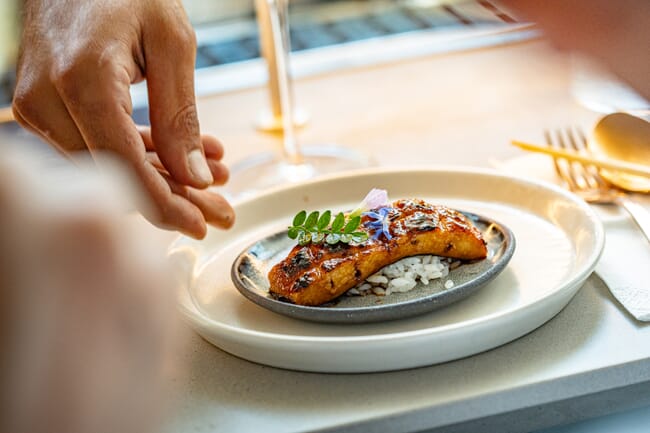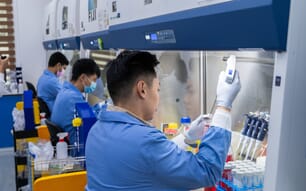
© Forsea
Taking place at the Tel-Aviv restaurant “a”, the tasting was attended by a small group of investors, journalists and key opinion leaders in the food industry, as well as representatives from the Japanese embassy and various Japanese food companies based in Israel.
On the menu were three creations which included Forsea’s cell-cultivated iteration of unagi kabayaki - grilled eel on a bed of aromatic rice.
Forsea says that it is on a mission to save wild eel populations, and other species at risk, by pioneering a new approach to cell cultivating fish tissues using organoid technology. The company’s patented method involves creating the ideal environment for fish cells to spontaneously assemble themselves into three-dimensional tissue structures with their natural composition of fat, muscle and connective tissue.
According to the startup, this method of cell-cultivation also bypasses the scaffolding stage and dramatically reduces the dependence on costly growth factors. This makes the process highly scalable, raising its commercial viability as well price parity with traditionally farmed eel meat. Wild eel has been experiencing severe supply shortages due to overfishing, while aquafarming of eel remains difficult, and breeding eel in captivity remains elusive.
This shortfall occurs amidst a surge in demand for the Japanese delicacy, not only among the Japanese population but also across Asia, the United States and Europe. This has resulted in a jump in the wholesale price of freshwater eels to as high as $60 per kilo.
“Forsea’s unique organoid technology has the potential to overcome many of the industry bottlenecks in bringing cultivated meat to the consumer plate,” said Roee Nir, CEO and co-founder of Forsea, in a press release. “Since the start of the year, we made significant advancements in improving our cell lines. We also have been working diligently to enhance our recipes. This event was a great opportunity for us to present our unprecedented achievements to partners and industry stakeholders.”
Israeli chef Yuval Ben Neriah, specialist in Asian cuisine, played a pivotal role in fine tuning the finished product to capture the authentic flavor and sensory attributes of the Japanese specialty.
“As a chef who spent many years tantalizing diners with fine Asian cuisine, this project with Forsea has been particularly exciting as it marks my first venture into future food and the world of cell-cultured seafood and its resonating sustainability message,” says Ben Neriah, chef of restaurant a. “The feedback from the diners was indeed uplifting. Several remarked that they wouldn’t have guessed that the unagi was cell-cultivated had they not been informed.”




